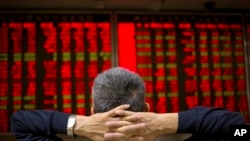A U.N. organization that focuses on helping developing countries become better integrated into the global economy is warning that the world's recent financial turmoil highlights the need for new approaches to international trade and development.
The U.N. Conference on Trade and Development (UNCTAD), in its annual report released Tuesday, called for reforming governance of the International Monetary Fund, strictly separating retail and investment banking, providing greater support for development banks, and making it easier for countries to pay for imports and exports in their own currencies without bringing in a third-country currency, such as the U.S. dollar.
The group said that as the world’s debt has ballooned in recent years to nearly $200 trillion, many countries and their creditors need a better way to restructure unsustainable debt.
To emphasize its perception of a perilous global economy, the cover of the UNCTAD report is illustrated with a house of cards.,
“And that’s really the key message that we want to convey — is how to ensure that we’re not building a house of cards for an international monetary and financial system for the future, but to look at ways of maybe putting in more secure foundations,” Steve MacFeely, UNCTAD's head of development statistics and information branch, told reporters in Bangkok on Monday.
Continued slowdown
Developing countries' growth is forecast to decline to around 4 percent in 2015, continuing a slowdown that began in 2001. Developed countries, meanwhile, are expected to grow at about 1.9 percent, according to UNCTAD.
Officials of UNCTAD, which is headquartered in Geneva and governed by its 194 member states, are trying to address fundamental issues with an international monetary system they contend is not functioning as it should.
UNCTAD's officials and others in the U.N. family express frustration that major economies and lending bodies, such as the IMF and World Bank, have not instituted significant reforms in wake of the 2007-08 global financial crisis, from which there has not been a full recovery.
“The world economy is not out of the woods yet. A lot more work needs to be done,” said Hamza Ali Malik, chief of macroeconomic policy and analysis at the U.N.'s Economic and Social Commission for Asia and the Pacific. The group supports integrating all countries into the international trading system, and forging international investment agreements aimed at promoting sustainable development goals.
UNCTAD, founded in 1964, has long struggled to be taken seriously as it focuses on exploring macroeconomic issues from a development perspective.
“One can point to past examples where they were years ahead of the time,” said Paul Rogers, a professor of peace studies at Bradford University in the United Kingdom. But he said UNCTAD had been dismissed over the decades for its inability to forge a consensus on key issues, with critics saying its acronym actually stood for “Under No Circumstances Take Any Decision.”
Keynesian approach
Part of the criticism of UNCTAD also stems from it adhering to the path of Keynesian macroeconomics while the world's financial institutions have long preferred the neo-liberal approach. The theory put forth by John Maynard Keynes advocates government intervention to stabilize economies, while neo-liberals favor deregulation, greater power for the private sector, and expanding openings of markets and trade.
UNCTAD is “without any power base among the really major economies,” including China, Rogers told VOA. “It tends to have this almost secondary role of saying what is necessary, frequently being right, but rarely being listened to.”
In its 2015 report, UNCTAD provocatively targeted the dominant credit ratings agencies, Fitch, Moody's and Standard & Poor's, suggesting they be replaced by a public international institution after their failure to properly gauge the risk of the toxic debt responsible for triggering the most recent global financial crisis.
“They should either be removed from the system” or improve their models, MacFeely told reporters at a briefing ahead of the 187-page report's release.
Debtor economies
UNCTAD's voicing support for a “fair and efficient sovereign debt workout mechanism” will strike a pleasant chord with many Greeks and those in other eurozone countries whose economies have been crippled by unsustainable debt.
“The real problem is the current system puts the burden and the adjustment on the debtor economies through conditionalities that demand austerity and structural reform with a recessionary bias,” said MacFeely. “It tends to be the public that feels this most. So we argue that we need a more equitable approach to sovereign debt restructuring, and this is needed urgently.”
Another alarm, according to MacFeely, has been triggered by the bursting of the stock market bubble in China, raising concerns for all of Southeast Asia. But the UNCTAD official said the report did not prioritize any particular region, instead highlighting “that there are fragilities, basically, everywhere.”













